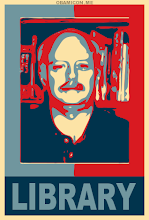As a member of a community, you are valued for what you know even though it is recognized that you still need to learn things. One key piece of this article relates learning communities to the use of technology. One of the models suggested using the themes below:
- Students-as-scientists (or social scientists or historians)
- Information or data at the center of problems
- Constructivist learning (where students create their own understanding)
- Societal implications of intellectual inquiry
- Collaborative/cooperative learning
- Appropriate use of technology
The author looks at the research of Nardi and O'Day (1999) which uses the term information ecologies to describe learning communities. The parts are:
- System. All of the members - students, teachers, librarians, administrators - are necessary parts and a change to one changes all.
- Diversity. Everyone involved has multiple roles to play and all of those roles are necessary for success.
- Coevolution. The members of the community grow and change in relationship to the other members of the community.
- Locality. What the technology is is almost irrelevant. What is important is who uses it, where it is used, and how it is used.
- Keystone Species. These are the members who are key to the survival of the community.
- Information technologies. In our environment, this would be computers, catalogs, databases and the Internet.
- Communication technology. This includes email, instant messaging, and more. Much of social networking (Facebook, Twitter, etc.) fall into this group.
- Dissemination technology. These are the technologies that are most like tools and include word processing software, databases, desktop publishing, and more.
Some of the possible techniques that can be used in learning communities include:
- electronic field trips.
- online mentoring and distance education.
- science investigations.
- learning communities in the humanities and social sciences.
There are also a number of challenges related to technology which include:
- The Internet has become the first stop in research instead of the library.
- Inadequate tech support and staff development for teachers.
- Teachers using old techniques to teach new technology.
- Understanding that not all technology tools work in the same environment.
- The Internet lacks adequate intelligent guideposts. All information is treated equally even when it is not equal.
Related Articles
Bennett, O. and Gilbert, K. (2009, May) Extending liaison collaboration: partnering with faculty in support of a student learning community. Reference Services Review, 37(2), 131-142.
Held, T. (2009, May). The Information and Learning Commons: a selective guide to sources. Reference Services Review, 37(2), 190-206.

I bet you liked this chapter Tom.
ReplyDeleteI see you as the ultimate member of the 21st Century learning/school community. You communicate well, help others reach goals, are up on the latest technology which allows collaboration and every member to shine in his or her own, special way and welcoming to everyone's ideas.